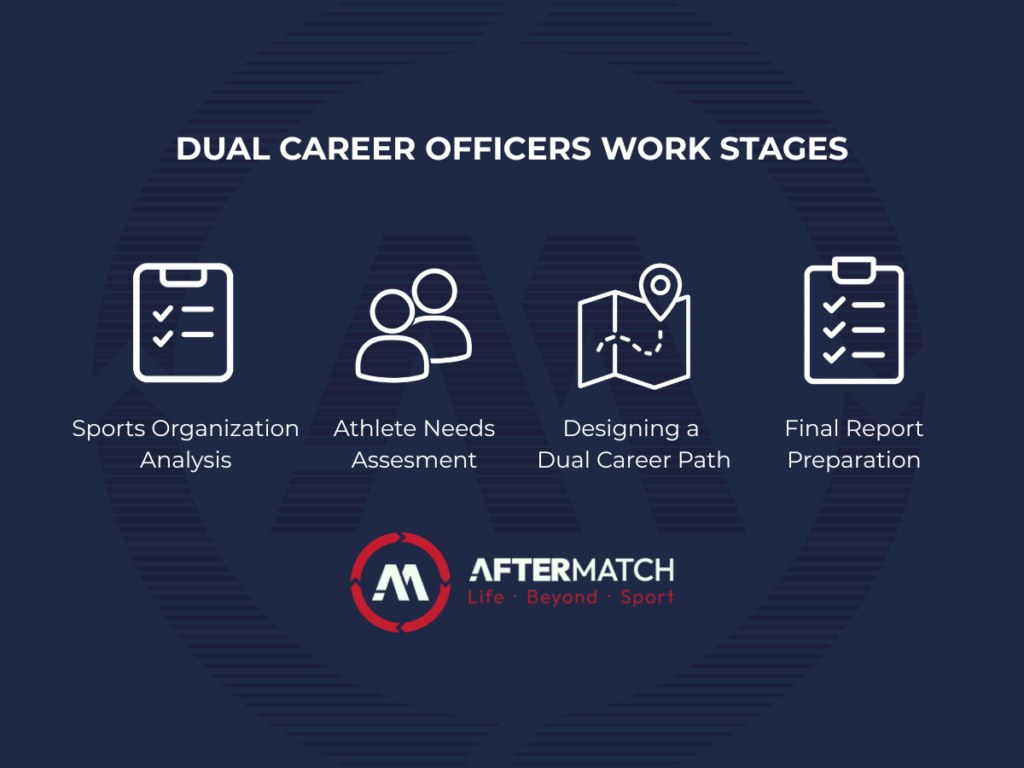As thousands of athletes across Europe prepare for life after competitive sport, one question becomes critical: who helps them plan for their future? That’s exactly where Dual Career Officers (DCOs) come in.
The AFTERMATCH 2.0 Reload project, co-funded by the European Union, is building a strong European network of DCOs – individuals who work in clubs, sports associations, or are athletes themselves. Their mission is to guide athletes through the complex process of balancing elite competition with education, work, and life beyond sport.
What Is a #DualCareer?
A #DualCareer is more than a buzzword – it’s a strategic approach to athlete development that ensures athletes have opportunities to study, gain work experience, and prepare for a professional career during and after their time in competitive sport.
DCOs are the key to implementing this vision in local and national sports organizations.
The Four Phases of a DCO’s Work
To train and equip Dual Career Officers with the right skills, AFTERMATCH 2.0 Reload developed a structured, four-phase methodology that DCOs apply in their work with athletes and sports institutions:

Phase 1: Analysis of the Sports Organization’s Needs
DCOs begin by:
– Gathering internal information about the club or federation’s current support for dual careers,
– Conducting a SWOT analysis of strengths, weaknesses, opportunities, and threats,
– Benchmarking against best practices from other organizations,
– Creating a report with recommendations.
Phase 2: Analysis of the Athlete’s Needs
This is where the work becomes personal. DCOs:
– Meet individually with athletes,
– Assess their current skills, academic background, and ambitions,
– Identify the type of support they need,
– Build a Personal Development Plan (PDP) tailored to the athlete’s goals and timeline.
Phase 3: Designing the Dual Career Path
Once both the athlete’s and the organization’s needs are clear, DCOs help map out a practical, achievable Dual Career Path. This may include:
– Enrolling in suitable educational programs,
– Planning a flexible training schedule,
– Accessing mentorship or internships,
– Setting milestones that fit within the athlete’s competition calendar.
Phase 4: Final Report and Monitoring
The process concludes with a documented report that includes:
– Feedback from both the athlete and the organization,
– A clear action plan for implementation,
– Defined responsibilities and check-in points,
– Distribution to all relevant stakeholders.
Completed International DCO Seminars – and What’s Next?
So far, we’ve hosted successful International DCO Seminars in:
– Los Alcázares, Spain
– Kraków, Poland
– Lisbon, Portugal
The upcoming events for 2025 will take place in:
– Baku, Azerbaijan (May 29–31)
– Maribor, Slovenia (September 19–21)
– San Donà di Piave, Italy (September 26–28)
– Patras, Greece (October 5–7)
– Nicosia, Cyprus (October 22–24)
Why It Matters
Thousands of athletes retire every year from sport – often without a clear plan for the future.
By training DCOs across Europe, we ensure athletes don’t face that transition alone.
We give them tools.
We give them structure.
We give them a future.
Want to learn more about the role of DCOs or how to implement a #DualCareer approach in your organization? Follow us – we’ll be sharing more tools and examples from the field.